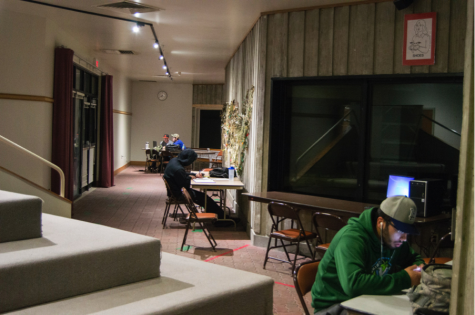Athlete study hall opens in old chimposium
November 9, 2014
This year, Central’s athletics department decided to make use of the vacant space in the old Chimposium and turn it into the Wildcat Academic Success Center.
The athletics department has used the building to create a study hall program for all varsity sports teams at Central.

FOCUS – Student athletes use the time designated for them to complete their coursework.
Student athletes at Central and in the NCAA are expected to maintain a level of success both on the field and in the classroom.
“We wanted to unify our student athlete study hall program,” Mal Stewman, academic success coordinator, said. “Lots of teams had their own forms of team study hall, but with this program we get to all work together and have the same system, which makes it more organized.”
The program is a way to set aside time for athletes to come and get their schoolwork done. Freshman and sophomore student athletes, or those with a GPA under a 3.0, are required to be in study hall for four hours per week, Stewman said athletes who are under a 2.5 GPA or “at risk” of losing playing eligibility are required to attend six hours per week.
By setting aside mandatory study time, students athletes are forced to be productive.
“Study hall has really helped me get my stuff done,” Maggie McTaggert, freshman volleyball player, said. “When I am here, I have to do my work, but when I am at my dorm, it’s easy to procrastinate and find something else to do other than my school work.”
Study hall monitors make sure athletes aren’t using social media, surfing the web or sending personal emails. Student athletes are held to the standard that they are coming to study hall to stay on top of their school work.
“We are trying to create a culture of academic success and add to the athlete experience here at Central,” Stewman said.
It is the goal of the athletics department to make sure that the transition from high school athletics to the collegiate level is smooth and not too overwhelming for student athletes, Stewman said.
The program offers more than just a quiet place to study. It’s also giving students help with financial aid, advising, organizational tips and time management skills.
“I’ve been able to stay more organized with my schoolwork because of study hall,” Jerome Bryant, freshman basketball player, said. “I just come in between my classes and knock out any stuff I need to do so I don’t have to worry about it. It’s easy.”
The athletics department wants to make sure student athletes’ time at Central is rewarding.
“We aren’t like the big Division I programs, where we are on television and in big stadiums,” Stewman said. “We can make sure that they not only enjoy their time here, but they leave CWU with their degree and positive experiences as a student athlete.”


Von M. Elison, Executive Director, Central WA Disability Resources (CWDR) • Feb 27, 2015 at 10:29 am
First of all, I would like to express my empathy and compassion to the employee who had experienced the assault by Brian Yancy,as I have personally been in that position before, and simply because the individual has a disability does not diminish the trauma.
Secondly, I am appalled at that the Observer would allow such personal information regarding his younger years, to become public knowledge. As a person with a disability myself, I would find it extremely inappropriate for any publication to write about my personal history. I cannot express how this article removed the dignity of someone who struggles daily; which is something Mr. Yancy needs help coping with, so there is not a repeat performance. We have to learn to live with invisible disabilities and how we live together. But articles such as “Brian’s Song” do not educate us on what autism is or what he personally struggles with. You should think about that and be ashamed of yourselves next time you think about printing an article that reveals such personal information.